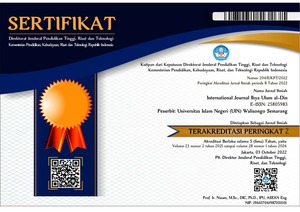The Controversy of Muhammad Baqir Ash-Sadr's Thoughts (Eastern Capitalist) with the Thoughts of Karl Marx and Max Weber (Western Capitalists) in the Context of Global Islamic Economic System
DOI:
https://doi.org/10.21580/ihya.24.1.7914Keywords:
Capitalism, Islamic Economy, GlobalizationAbstract
The fight in the globalization field between Eastern business people and Western industrialists shows strength for both. This article examines the improvement of Islamic financial matters in light of the contemplations of Muhammad Baqir Ash-Sadr, Karl Marx, and Max Weber in the humanistic perspective by taking a gander at the standards of worldwide Islamic financial matters in helping out a few non-Muslim nations. This research method uses library research, namely, taking information from books and scientific articles relevant to the problem to be answered. The consequences of this study show that the reasoning of Marx and Weber about the Islamic monetary framework encountering a decay was gone against by Muhammad Baiqr Sadr. That's what sadr censures if Marxism denies things connected with a powerful way of thinking; without anyone else, Marxism has isolated itself from things not related to science. The standards of Islamic lessons as the principal reason for making progress in business are demonstrated to have the option to contend worldwide. For instance, Saudi Aramco organizations, Islamic Development Bank (IDB), Qatar National Bank (QNB), Ooredoo, and the Fly Emirad Company are clear confirmations that they are huge organizations and impact financial backers in Western nations.
Downloads
References
Bahri, Syaeful. 2021. "Prospect of Islamic Economic Studies." Enrichment: Journal of Management 12(1): 232–35.
Baqir Sadr, Muhammad. 1984. Iqtisaduna: Our Economics. Tehran: World Organisation for Islamic Services.
Chapra, Umer. 1999. Islam Dan Tantangan Ekonomi, Islamisasi Ekonomi Kontemporer. Surabaya: Risalah Gusti.
Dzikrulloh. 2021. "Transformasi Nilai Tauhid Dan Filosofis Ibadah Pada Pengembangan Ekonomi Islam." Izdihar: Jurnal Ekonomi Syariah 1. https://ejournal.unwaha.ac.id/index.php/izdihar/article/view/1687.
Galvan, Jose L., and Melisa C. Galvan. 2017. 53 Statistical Field Theor Writing Literature Reviews: A Guide for Students of the Social and Behavioral Sciences. Seventh. New York: Routledge.
Grier, Robin. 1997. 50 KYKLOS The Effect of Religion on Economic Development: A Cross-National Study of 63 Former Colonies.
Ismail, Indriaty, and Mohd Zuhaili Kamal Basir. 2012. "Karl Marx Dan Konsep Perjuangan Kelas Sosial." International Journal of Islamic Thought 1(1): 27–33.
Jamaludin, Adon Nasrullah. 2016. Pustaka Setia Bandung Sosiologi Pembangunan. 1st ed. Bandung: CV. Pustaka Setia.
Jati, Wasisto Raharjo. 2013. "Memahami Globalisasi Sebagai Evolusi Kapitalisme." Global & Strategis 72(2): 241–58.
Keskin, Tugrul. 2011. The Sociology of Islam: Secularism, Economy and Politics. 1st ed. ed. Tugrul Keskin. Lebanon: Ithaca Press, 8 Southern Court, South Street, Reading, RG1 4QS, UK. www.Ithaca press.co.uk%0AIthaca.
Mohiuddin, Asif. 2019. "Globalisation, State and Transnational Islamist Movements Exploring The Intersection Between Politics and Religion in The Middle East." Word Affairs Spring 23(1): 70–91. http://www.uta.fi.
Mubarok, Muh. Abduh El. 2008. "Ideologi Borjuis (Studi Pemikiran Karl Marx)." Institut Agama Islam Negeri Sunan Ampel Surabaya. http://digilib.uinsby.ac.id/id/eprint/8250.
Munir, Misbahul. 2015. Semangat Kapitalisme Dalam Dunia Tarekat. I. Malang: Intelegensia Media.
Nawab, Syed. 2003. Menggagas Ilmu Ekonomi Islam. Yogyakarta: Pustaka Pelajar.
Raharjo, Rachmatullah Oky, and Mulyono Jamal. 2018. "Perkembangan Dan Tantangan Bank Syariah Di Timur Tengah." In Proceeding International Conference of Afro-Asian University Forum (AAUF) on The Role of Afro-Asian Universities in Building Civilizations, eds. Amal Fathullah Zarkasyi et al. Ponorogo: Universitas Darussalam Gontor Press, 960–83.
Ramadani, Veland, Montpellier Business, Vanessa Ratten, and Sadush Tahiri. 2015. 15 Int. J. Business and Globalisation The Context of Islamic Entrepreneurship and Business: Concept, Principles and Perspectives Léo-Paul Dana.
Reda, Ayman. 2014. "Weber and Baqir As-Sadr: The Paradox of Economic Development in Islamic Societies." American Journal of Economics and Sociology 73(1): 151–77.
Saragih, Hojjatullah Ali Mohaqqiqi. 2015. "Falsafatuna Dan Iqtishaduna: Kritik Baqir Al Sadr Terhadap Kapitalisme Dan Sosialisme." Program Studi Aqidah dan Filsafat Islam, UIN Sunan Gunung Djati Bandung. https://www.academia.edu/download/56779135/Pemikiran_Filsafat_Baqir_Shadr.pdf.
Tripp, Charles. 2006. Islam and the Moral Economy: The Challenge of Capitalism. New York, Melbourne, Madrid, Cape Town, Singapore, São Paulo: Cambridge University Press. www.cambridge.org.
Wibisono, M. Yusuf. 2020. Sosiologi Agama. I. eds. M. Taufiq Rahman and M.F. Mubarok Zaky. Bandung: Prodi S2 Studi Agama-Agama UIN Sunan Gunung Djati.
Wigati, Sri. 2012. "Tanggung Jawab Negara Dalam Ekonomi Islam (Pemikiran Muhammad Al-Baqir As Sadr." 02(01): 368–86.
Winarno, Budi. 2009. Pertarungan Negara Vs Pasar. Jakarta: Media Pressindo.
Downloads
Published
How to Cite
Issue
Section
License
By submitting an article to the journal, the author(s) agree to transfer the published article's copyright to the journal, which will act as the publisher. This means the journal will have the right to publish the article in various forms, including reprints. The journal will maintain the publishing rights to the published articles.
This work is licensed under Creative Commons Attribution-ShareAlike 4.0 International License.
In line with the license, authors and third parties (readers, researchers, and others) are allowed to share and adapt the material. In addition, the material must be given appropriate credit, provided with a link to the license, and indicated if changes were made. If authors remix, transform or build upon the material, authors must distribute their contributions under the same license as the original.



